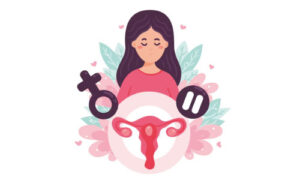PCOD - AN OVERVIEW
Polycystic Ovary Syndrome (PCOS), also known as PCOD (Polycystic Ovary Disorder), is a common hormonal disorder among women of reproductive age. In this disease, there are presence of multiple small cysts on the ovaries, irregular or absent menstrual periods, and elevated levels of androgens. PCOD is not just a reproductive health concern; it is often associated with metabolic disturbances, such as insulin resistance, which can increase the risk of Type 2 Diabetes and cardiovascular diseases. Additionally, the syndrome can impact a woman’s overall well-being, including her emotional and psychological health.
SYMPTOMS OF PCOD
It has been observed that not all woemn with PCOS will experience the same set of signs, and the severity of symptoms can vary from person to person. Additionally, some ladies may additionally remain asymptomatic till they encounter fertility issues or different headaches. Early detection and appropriate management can assist alleviate signs and decrease the hazard of lengthy-term fitness headaches associated with PCOS. If have PCOS or are experiencing symptoms, you must consult with a healthcare professional for a thorough assessment and prognosis. There is a range of symptoms, which may vary in severity among the women affected with Polycystic Ovary Syndrome (PCOS) or, PCOD. Common symptoms of PCOS include:
- Irregular Menstrual Cycles: Women with PCOS often experience irregular periods, which may be infrequent, absent, or unpredictable. This is due to hormonal imbalances affecting the normal ovulatory process.
- Ovulatory Dysfunction: PCOS can lead to irregular ovulation or anovulation (lack of ovulation), contributing to fertility issues and difficulty in conceiving.
- Hyperandrogenism: Elevated levels of androgens (male hormones) can lead to symptoms such as acne, oily skin, and increased facial or body hair (hirsutism). Some individuals may also experience male-pattern baldness.
- Polycystic Ovaries: The condition is often characterized by the presence of multiple small cysts on the ovaries, visible through ultrasound imaging. However, not all women with PCOS will have this feature.
- Weight Gain: Many women with PCOS may struggle with weight management. Insulin resistance, a common feature of PCOS, can contribute to weight gain, especially around the abdomen.
- Insulin Resistance: PCOS is often associated with insulin resistance, where the body’s cells become less responsive to insulin, leading to elevated blood sugar levels. This can increase the risk of Type 2 diabetes.
- Fatigue: The hormonal imbalances and metabolic changes associated with PCOS can contribute to feelings of fatigue and low energy levels.
- Mood Changes: Some women with PCOS may experience mood swings, anxiety, or depression. Hormonal fluctuations and the impact of the condition on self-esteem and body image can contribute to emotional symptoms.
CAUSES OF LIBIDO LOSS
Causes of Polycystic Ovary Syndrome (PCOS) are likely to involve a combination of genetic, hormonal, and environmental factors. Several key factors contribute to the development of PCOS:
- Genetics: There appears to be a genetic component to PCOS, as it often tends to run in families. If a woman has a close relative with PCOS, her risk of developing the condition may be higher.
- Hormonal Imbalances: PCOS is characterized by an imbalance in sex hormones, particularly an elevated level of androgens (male hormones) compared to estrogen and progesterone. This hormonal imbalance disrupts the normal ovarian function, leading to irregular ovulation and the formation of ovarian cysts.
- Insulin Resistance: Many women with PCOS have insulin resistance, a condition in which the body’s cells become less responsive to the effects of insulin. This can lead to elevated levels of insulin in the bloodstream, contributing to increased androgen production and interfering with normal ovulatory function.
- Inflammation: Chronic low-grade inflammation may play a role in the development of PCOS. Inflammation can contribute to insulin resistance and disrupt the normal functioning of the ovaries.
- Lifestyle Factors: Environmental and lifestyle factors, such as diet and physical activity, can influence the development and severity of PCOS. Obesity, in particular, is associated with a higher risk of PCOS and can exacerbate symptoms.
- Exposure to Elevated Androgens in the Womb: Some studies suggest that exposure to higher levels of androgens in the womb during fetal development may contribute to the development of PCOS later in life.
PREVENTION OF PCOD
While Polycystic Ovary Syndrome (PCOS) has a genetic issue, and some elements main to its development can be beyond one’s manipulate, there are lifestyle measures that could potentially lessen the threat of PCOS or assist manipulate its signs and symptoms. Here are a few preventive measures and way of life techniques that can be useful:
Maintain a Healthy Weight: Obesity is a risk factor for PCOS, and maintaining a healthy weight through regular exercise and a balanced diet may help reduce the risk and manage symptoms.
Balanced Diet: Adopting a diet rich in whole foods, fruits, vegetables, and whole grains while limiting processed and sugary foods can support overall health. A well-balanced diet can also help manage insulin levels.
Regular Exercise: Engaging in regular physical activity can help improve insulin sensitivity, manage weight, and promote overall well-being. Aim for at least 150 minutes of moderate-intensity aerobic exercise per week.
Manage Stress: Chronic stress can contribute to hormonal imbalances. Incorporate stress-reducing activities into your routine, such as mindfulness, yoga, meditation, or other relaxation techniques.
Regular Health Check-ups: Regular health check-ups and screenings can help detect and manage conditions like insulin resistance or hormonal imbalances early on.
Limit Exposure to Environmental Toxins: Reduce exposure to endocrine-disrupting chemicals found in some plastics, household products, and pesticides.
Avoid Smoking and Excessive Alcohol Consumption: Both smoking and excessive alcohol intake can have negative effects on hormonal balance and overall health.
Birth Control Pills: For some women, the use of oral contraceptives may help regulate menstrual cycles and control symptoms. However, this is a decision that should be made in consultation with a healthcare provider.
PCOD DIAGNOSIS
The most commonly used criteria for diagnosis are those established by the Rotterdam criteria, which require the presence of at least two out of the following three criteria:
- Irregular or absent menstrual cycles
- Clinical or biochemical signs of hyperandrogenism (such as hirsutism or elevated androgen levels)
- Polycystic ovaries on ultrasound
Here are the key steps involved in the diagnosis of PCOS:
Medical History: The healthcare provider will inquire about your menstrual history, including the regularity of your periods, any changes in menstrual flow, and the presence of other symptoms such as acne or excessive hair growth. They will also ask about your family and personal medical history.
Physical Examination: A physical examination may be conducted to assess signs of PCOS, such as hirsutism (excessive hair growth), acne, and signs of insulin resistance. The provider may also perform a pelvic examination to check for any abnormalities.
Blood Tests:
- Hormone Levels: Blood tests may be conducted to measure hormone levels, including levels of androgens (such as testosterone), estrogen, and progesterone. Elevated levels of androgens are common in PCOS.
- Lipid Profile: Since women with PCOS may be at a higher risk of cardiovascular issues, a lipid profile may be done to assess cholesterol levels.
- Insulin Levels: Testing for insulin resistance may be considered, as insulin resistance is commonly associated with PCOS.
Ultrasound Imaging: A pelvic ultrasound may be performed to visualize the ovaries. The presence of multiple small cysts on the ovaries, often referred to as a “string of pearls” appearance, is a common characteristic of PCOS. However, it’s important to note that not all women with PCOS will have this feature, and not all women with this ovarian appearance necessarily have PCOS.
Exclusion of Other Conditions: The healthcare provider may perform tests to rule out other conditions that can mimic PCOS symptoms.
ALLOPATHY APPROACH TOWARDS PCOD TREATMENT
It’s important to note that the management of PCOS in allopathic medicine is tailored to the individual, considering factors such as age, reproductive goals, and the presence and severity of specific symptoms. The approach may evolve over time based on the patient’s response to treatment and any changes in health status.
The allopathic (conventional medical) approach towards the treatment of Polycystic Ovary Syndrome (PCOS) is typically multifaceted, aiming to address the various symptoms and underlying hormonal imbalances associated with the condition. The treatment plan is often individualized based on the specific symptoms and goals of the patient. Here are common components of the allopathic approach to PCOS treatment:
Hormonal Birth Control: Oral contraceptives (birth control pills) are frequently prescribed to regulate menstrual cycles and manage hormonal imbalances. They contain a combination of estrogen and progestin, which helps control androgen production and regulate the menstrual cycle.
Anti-Androgen Medications: Medications that block the effects of androgens or reduce androgen production may be prescribed to address symptoms such as hirsutism (excessive hair growth) and acne. Spironolactone is a common anti-androgen medication used in PCOS treatment.
Insulin-Sensitizing Medications: Insulin resistance is a common feature of PCOS, and medications such as metformin may be prescribed to improve insulin sensitivity. This can help regulate menstrual cycles and reduce symptoms associated with insulin resistance, such as weight gain.
Fertility Medications: For women with PCOS struggling with infertility, medications such as clomiphene citrate or letrozole may be prescribed to induce ovulation and improve the chances of conception.
Lifestyle Modifications: Lifestyle changes are often recommended to manage weight, improve insulin sensitivity, and reduce the risk of complications. This may include adopting a healthy diet, engaging in regular exercise, and managing stress.
Management of Individual Symptoms: Treatment may also involve addressing specific symptoms, such as acne or hair loss, through topical medications or other interventions.
Regular Monitoring and Follow-Up: Women with PCOS typically require regular monitoring to assess the effectiveness of treatment and make any necessary adjustments. This may involve periodic blood tests, imaging studies, and assessments of symptomatology.
AYURVEDA APPROACH TOWARDS PCOD TREATMENT
Ayurveda, the traditional machine of medication that originated in India, takes a holistic approach to health and specializes in balancing the frame, mind, and spirit. In the context of Polycystic Ovary Syndrome (PCOS) or PCOD (Polycystic Ovary Disorder), Ayurveda targets to deal with the foundation reasons of the situation and repair stability to the frame. Here are a few not unusual principles and processes in Ayurveda for coping with PCOD:
- Diet and Nutrition:
- Balancing Doshas: Ayurveda emphasizes the importance of dietary choices that balance the three doshas (Vata, Pitta, and Kapha). An individualized diet based on one’s predominant dosha is often recommended.
- Anti-Inflammatory Foods: Foods with anti-inflammatory properties, such as turmeric, ginger, and various spices, are often incorporated into the diet to reduce inflammation associated with PCOD.
- Herbal Remedies:
- Ashwagandha: Known for its adaptogenic properties, ashwagandha is believed to help balance hormones and reduce stress, which can be beneficial for PCOD management.
- Shatavari: This herb is traditionally used to support female reproductive health and hormonal balance.
- Guduchi (Tinospora cordifolia): Guduchi is considered an immunomodulator and is used in Ayurveda to support overall health, including reproductive health.
- Lifestyle Modifications:
- Yoga and Meditation: Stress management is crucial in Ayurveda for PCOD. Practices such as yoga and meditation are recommended to reduce stress and improve overall well-being.
- Regular Exercise: Physical activity is seen as essential for maintaining balance in the body. Ayurveda often suggests gentle, grounding exercises like walking or yoga.
Detoxification (Panchakarma):
Panchakarma Therapies: Ayurvedic detoxification procedures, such as Abhyanga (oil massage), Swedana (sweating therapy), and Virechana (purging therapy), may be recommended to eliminate toxins and balance the doshas.
- Ayurvedic Diagnosis (Prakriti Analysis):
- Constitutional Assessment: Ayurvedic practitioners assess an individual’s prakriti (constitution) to tailor treatments based on their unique physical and mental characteristics.
ROLE OF PANCHKARMA IN PCOD TREATMENT
Panchakarma is a set of Ayurvedic healing techniques that intention to detoxify and rejuvenate the frame. While Panchakarma won’t be a primary treatment for the management of Polycystic Ovary Syndrome (PCOS) or PCOD, it is on occasion incorporated as a part of an Ayurvedic approach to cope with underlying imbalances and promote universal fitness. Here are some components of the way Panchakarma may be taken into consideration in PCOD remedy:
Detoxification: Panchakarma procedures are believed to help eliminate accumulated toxins (ama) from the body. Detoxification is thought to support the balance of doshas, especially when there is an excess of Kapha dosha associated with PCOD.
Balancing Doshas: Panchakarma is designed to balance the three doshas—Vata, Pitta, and Kapha. In the context of PCOD, an imbalance in Kapha dosha is often considered. Panchakarma treatments aim to reduce Kapha excess through procedures like Vamana (therapeutic vomiting) and Virechana (purgation).
Stress Reduction: Stress is a common factor associated with hormonal imbalances, including those in PCOD. Panchakarma therapies, such as Abhyanga (oil massage) and Shirodhara (a continuous flow of warm oil on the forehead), are believed to help reduce stress and promote relaxation.
Enhancing Digestion and Metabolism: Some Panchakarma procedures, including Basti (medicated enema), are intended to improve digestion and metabolism. This may be relevant in PCOD, as metabolic factors are often associated with the condition.
Herbal Support: Panchakarma treatments are often complemented by the use of specific herbal preparations tailored to an individual’s needs. These herbs may further support the body’s natural healing processes.
PCOD TREATMENT AT DR MONGA MEDI CLINIC
Patients seeking PCOD remedy may reach out to Dr. Monga Medi Clinic instantly via phone or email to inquire about our PCOD treatment, PCOD remedy options, session strategies, and any precise programs we will provide.
We schedule a consultation with our Doctor. During the session, you can discuss about your clinical history, signs and symptoms, and issues associated with PCOD. You are encouraged to ask questions about the approach to PCOD remedy, the styles of treatments or interventions we will propose, and some other details which might be vital to you.
Once a analysis is done, we outline a treatment plan tailor-made to your individual needs. This may additionally include life-style guidelines, medications, Ayurvedic treatments, or a combination of strategies.
Remember that PCOD treatment frequently involves a aggregate of approaches, such as lifestyle changes, medications, and on occasion complementary healing procedures like Ayurveda. It’s critical to have open and sincere communique with your healthcare company and to follow their steering.
FREQUENTLY ASKED QUESTIONS
Treatment may include hormonal contraceptives, anti-androgen medications, insulin-sensitizing drugs, lifestyle modifications, and, in some cases, fertility treatments.
Yes, irregular ovulation and hormonal imbalances associated with PCOS/PCOD can impact fertility. However, fertility treatments may be effective in some cases.
PCOS/PCOD is associated with an increased risk of other health conditions, including type 2 diabetes, cardiovascular disease, and endometrial cancer.
Ayurveda offers holistic approaches to manage PCOS/PCOD, including dietary changes, herbal remedies, and lifestyle modifications. It’s often used in conjunction with conventional treatments.
Some people find relief from symptoms through natural remedies like herbal supplements, dietary changes, and stress reduction techniques. However, it’s important to consult with a healthcare professional before trying any new approach.
INFORMATIVE ARTICLES ON WOMEN PROBLEMS

Vaginismus
Vaginismus: Symptoms, Causes, Treatments and Home Remedies Living with vaginismus can be a deeply personal and often confusing experience. You might feel alone, frustrated, or

Loss of libido
LOSS OF LIBIDO – AN OVERVIEW Loss of libido is a complex issue that can have physical, psychological, and interpersonal factors. Addressing the underlying causes

PCOD
PCOD – AN OVERVIEW Polycystic Ovary Syndrome (PCOS), also known as PCOD (Polycystic Ovary Disorder), is a common hormonal disorder among women of reproductive age.











